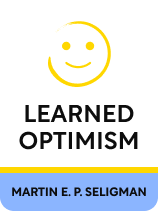

This article is an excerpt from the Shortform book guide to "Learned Optimism" by Martin E. P. Seligman. Shortform has the world's best summaries and analyses of books you should be reading.
Like this article? Sign up for a free trial here.
Can optimism be learned? How can you learn to be optimistic? What is Martin Seligman’s advice?
According to Martin Seligman, optimism means having an empowered and confident mindset. Seligman says you can learn to be optimistic just like you learn a new skill—through practice and dedication.
Keep reading to find out how you can learn to be optimistic, according to Seligman’s advice.
Learning Optimism: Martin Seligman’s Advice
According to Martin Seligman, optimism should be taught alongside his theory of learned helplessness. Many people suffer from learned helplessness: the belief that they don’t have the power to make positive changes in their own lives or in the world around them. Martin Seligman’s Learned Optimism book teaches you how to break out of that pessimistic, powerless mindset and replace it with an empowered mindset of optimism and confidence.
In psychology, learned helplessness is the belief that you can’t change things and that your efforts won’t make a difference. It’s called learned helplessness because it comes from experience: You go through important situations in which you can’t change the outcome, so you come to believe that you can’t affect the outcome of any important situation.
Seligman adds that many people learn helplessness as children, especially from their parents and teachers. Every time an adult dismisses a child’s contributions and ignores his or her efforts, it ingrains helplessness into that child’s psyche.
Learning New Thought Patterns
To be optimistic, Martin Seligman says you should change your thought pattern. The first step is figuring out how you currently think. According to Seligman, you can find out which thought pattern you have using a simple system:
First, identify a problem you’ve faced recently—perhaps an argument with a friend, a car accident, or an issue at work or school. Next, examine your thoughts about that event; in other words, what story are you telling yourself about why the problem happened? For example, do you believe that you made a mistake at work because you’re stupid or bad at your job? Or did you make that mistake because something distracted you, or because you didn’t have the right information on hand?
Finally, consider the results of the problem and your own thoughts about it. Some questions you might ask yourself here are:
- How do you feel?
- Is the problem still weighing on you?
- Have you learned something from the experience?
- Do you think you’ll be able to avoid that problem in the future?
(Shortform note: What Seligman describes here is a Cognitive Behavioral Therapy (CBT) technique called guided discovery. Guided discovery aims to disrupt your thoughts; to break up the automatic patterns you fall into so you can examine and correct them. However, it’s worth noting that guided discovery is usually done with the help of a trained therapist—someone who knows how to recognize harmful thought patterns and guide you toward more helpful ones. Though Seligman is a psychologist, and his method of changing your thoughts by questioning them is similar to guided discovery in a professional setting, to learn optimism, Martin Seligman’s advice alone may not produce the best results. This technique will be more effective with the help of a therapist or counselor.)

———End of Preview———
Like what you just read? Read the rest of the world's best book summary and analysis of Martin E. P. Seligman's "Learned Optimism" at Shortform.
Here's what you'll find in our full Learned Optimism summary:
- How to break out of a pessimistic, powerless mindset
- How to develop a mindset of empowerment, optimism, and confidence
- How to balance your optimism with realism






